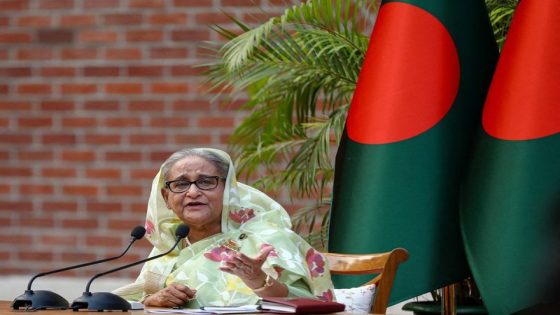DHAKA (Reuters) – At least 20 people were injured in clashes and police fired rubber bullets and tear gas to disperse crowds as thousands protested in the Bangladeshi capital and other parts of the country on Friday, calling on Prime Minister Sheikh Hasina to resign.
The protesters were demanding justice for the families of the 150 people killed in violence during protests last month over a job quota system.
Scores of youths marched in Dhaka with chants of “we want justice” and waved anti-government banners. Elsewhere in the country, buildings including a district office of the ruling Awami League party were set ablaze, a police booth was set on fire, and armoured vehicles vandalised during demonstrations.
Police said they fired rubber bullets and tear gas as crowds attacked them in northeastern town of Habibganj, and lobbed stun grenades to scatter protesters in the nearby city of Sylhet. A witness in Sylhet said about 20 people were injured.
“They set fire to the local Awami League office and several other government offices and torched motorcycles,” said Khalilur Rahman, a police official in Habiganj, adding police had fired rubber bullets and tear gas to control the situation.
The current unrest is the biggest test facing Hasina since deadly protests when she won a fourth-straight term in January elections that were boycotted by the main opposition Bangladesh Nationalist Party.
Student groups led demonstrations last month against quotas in government jobs, including a 30% reservation for families of veterans of the 1971 war of independence from Pakistan.
Those demonstrations spiralled into violence that killed at least 150 people, injured thousands and led to about 10,000 arrests. The protests paused after the Supreme Court scrapped most quotas.
Students have returned to the streets in sporadic protests this week, demanding justice for families of those who were killed. Critics of Hasina and human rights groups have accused her government of using excessive force to stamp out the movement, a charge both Hasina and her ministers deny.
“People make mistakes. If she (Hasina) would have apologised, everything would be back to normal. If she cannot control it, things will keep heating up,” said Syed Sadman, a student, at a protest in Dhaka.
(Reporting by Ruma Paul in Dhaka; Writing by Shivam Patel; Editing by Frances Kerry)
Source Agencies


